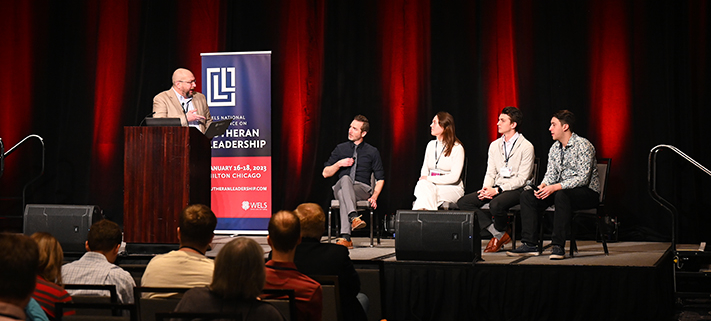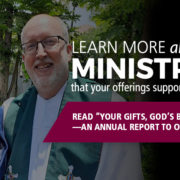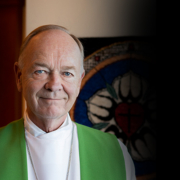Leadership conference equips members to serve
Last week, more than 1,300 WELS members gathered in Chicago for the WELS National Conference on Lutheran Leadership. For three days they dedicated themselves to learning about leading in the congregation and community as well as enjoying worship and fellowship. The conference was for all WELS members, both called workers and laypeople, men and women of all ages, and current leaders and future leaders.
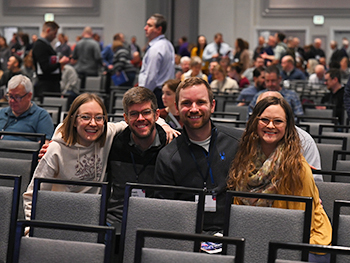 The conference kicked off Mon., Jan. 16, 2023, with an opening devotion led by WELS Michigan District President Rev. Snowden Sims. The afternoon was spent absorbing the first three keynote presentations. The day concluded with a worship service, with 1,300 Christians raising their voices in glory to God and sharing in the Lord’s Supper. Music was led by varied instrumentation and members of the Wisconsin Lutheran Seminary Chorus. Rev. James Huebner, WELS first vice president, served as the preacher. A portion of the opening worship service is available to view online.
The conference kicked off Mon., Jan. 16, 2023, with an opening devotion led by WELS Michigan District President Rev. Snowden Sims. The afternoon was spent absorbing the first three keynote presentations. The day concluded with a worship service, with 1,300 Christians raising their voices in glory to God and sharing in the Lord’s Supper. Music was led by varied instrumentation and members of the Wisconsin Lutheran Seminary Chorus. Rev. James Huebner, WELS first vice president, served as the preacher. A portion of the opening worship service is available to view online.
Kicking off the keynotes were Dr. Joan Prince and Rev. Dr. Kenneth Fisher, with a presentation titled “A Courageous Conversation on Modeling Gospel-Centered Unity.” While acknowledging the lack of diversity across WELS, they reminded attendees not to let man-made constructs be a barrier to sharing God’s love; we are all citizens of a greater kingdom. As Fisher explained, the unbelieving world will see God’s love through the actions of believers. Prince spoke about how there are many ideas for unity in the world, but none of them work without the gospel.
The second keynote had Mr. Kurt Nitz and Rev. Eric Roecker, director of the WELS Commission on Evangelism, present “Culture Is Critical: Shaping a God-Pleasing Congregational Culture.” They defined culture as the shared thought-habits that form the way people behave and work together. Good organizational culture, they explained, is the product of intentional and deliberate actions. Because of the important God-given work of Christians, a good culture is critical for congregations.
Rounding out the afternoon was Rev. Jonathan Bauer, speaking on “Our Lutheran Moment: Why Now Is a Good Time for Us to Be Doing What We Do Best.” Bauer summarizes his presentation: “The last few years have presented an unending string of challenges to all leaders, including Lutheran ones. They’ve also done us a huge favor. They’ve accelerated things that were happening slowly and brought to light things that were happening beneath the surface. They’ve made it apparent that what our world needs right now are the very things that we do best. We Lutherans are equipped to meet the challenges of our moment in a way that few others are interested in or capable of doing.”
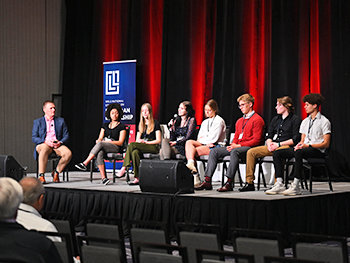 Day two of the conference gave attendees the opportunity to attend five breakout sessions on topics more specific to their local ministry needs or personal interests. Forty-seven breakout sessions on varying topics were available to choose from, offering something for every type of leader in the church.
Day two of the conference gave attendees the opportunity to attend five breakout sessions on topics more specific to their local ministry needs or personal interests. Forty-seven breakout sessions on varying topics were available to choose from, offering something for every type of leader in the church.
Topics ranged from personal evangelism, outreach, issues facing WELS schools, discipleship, congregational governance, church culture, worship, and more. Some trends emerged based on breakout requests that revealed common challenges in WELS congregations. Rev. Jonathan Hein, coordinator of WELS Congregational Services, says, “Looking at the top 20 [requested breakouts], I’d say how to develop and equip lay leadership was a massive goal. Any breakout about recruiting and equipping leaders had at least 120 people signed up. Another one seems to be the challenge of doing outreach and the challenges presented by the shifting American culture that is hardening against the church. Finally, the culture shifting breakouts did well.”
Mr. Kurt Nitz, breakout presenter of “Culture Shifting—How to Make It Happen,” led listeners through practical strategies for initializing culture changes in a congregation, such as knowing what the end goal is, the importance of leadership through the culture shift, and evaluating what already exists. Nitz, a WELS member, works with large organizations and corporations on their cultures and was asked to help develop Everyone Outreach, a program that helps congregations build a culture of outreach so that every ministry and every member is thinking about and participating in outreach. He says, “Every congregation has a culture and certain aspects of it can help or hinder your ministry. You should take a moment to look at it, and if it’s a barrier, do something about it.”
Dr. Glen Hansen, a radiologist and elder at Bethlehem, Germantown, Wis., attended the conference to bring ideas back to his congregation to help members become more comfortable with evangelism. “Our overall goal is not only to equip ourselves but to equip our members too,” says Hansen. “They can all be equipped to do the work of the Lord.” Of the conference, he says, “There are a lot of like-minded people who care about the work of the Lord, which helps me feel empowered to continue and go do that work.”
The breakout “Rethinking Congregational Partnership: Men and Women Working Together in Christ’s Mission” shared some practical considerations as congregations work toward ministry that honors God’s design for men and women and uses the gifts of every member of God’s family. “Rethinking congregational partnership means taking a look at the partnership men and women share. We are better together. We demonstrate this godly partnership to a world experiencing gender confusion and to future leaders in the church when we go through the hard work of putting God’s design for partnership into practice,” says Mrs. Dawn Schulz, a presenter at the breakout.
In the breakout “Leadership Skills Used in Industry and Ministry,” Mr. Chip Woods provided insights from his experience in the corporate world. He explains, “First, leadership skills that have been developed and learned in our vocations can also be applied in leading our ministries. Second, and inversely, servant leadership is not only effective in ministry but also in our vocations. And finally, time is important in industry as well as ministry. The time is now to spread the Word of God.”
Mr. Art Hora serves as the congregational chairman at St. Paul’s, Stevensville, Mich. When he’s not serving his church, he works in the nuclear power industry. “What I’ve learned from the things that I’ve seen here is that a lot of what I’ve done in the nuclear world can be brought back and applied, but in a different form.” Hora says, “There’s a lot to think about and pore over.”
Day three concluded the conference with two additional keynote presentations and a closing devotion, led by Rev. Michael Seifert, president of the WELS North Atlantic District.
For the first keynote on Wednesday, Prof. Luke Thompson presented “Thinking Differently: On How the Next Generation Thinks, and On How to Help Them Think,” where he addressed the types of doubt facing young Christians today. He stressed that in a world where everyone is “connected” digitally, what the younger generation truly needs is real connection and authentic relationships with their Christian family.
The final keynote was four TED-talk-style presentations from Rev. Mark Zarling, Dr. Donald Kudek, Rev. Luis Acosta, and Rev. David Scharf. Each presented his take on what Lutheran leadership is and why it’s important right now.
Attendees left the conference edified in their faith and inspired for their ministry. “I really like how not only did we have the keynote speakers but we got to choose breakout sessions that we think will line up with something we are really interested in or something that will help with our campus ministry,” says Hailey Russ, a student at Carroll University in Waukesha, Wis. “Not only am I getting personal information that will help me grow my faith and is firing me up a little bit, but also I have things that I want to take back to our campus ministry to implement.”
The ideas and inspiration could be overwhelming for WELS congregational leaders as they head home. Hein suggests, “Attendees don’t need to do everything all at once. There was a LOT there. But I’d love if those leaders would debrief about what they learned and pick a top priority or two to try and incorporate into their next annual plan.”
To find out more about the presenters or their presentations, visit lutheranleadership.com. Check back often as all the keynotes and several breakout sessions will be posted online in the coming weeks and months. Also, check out photos of the event online.

